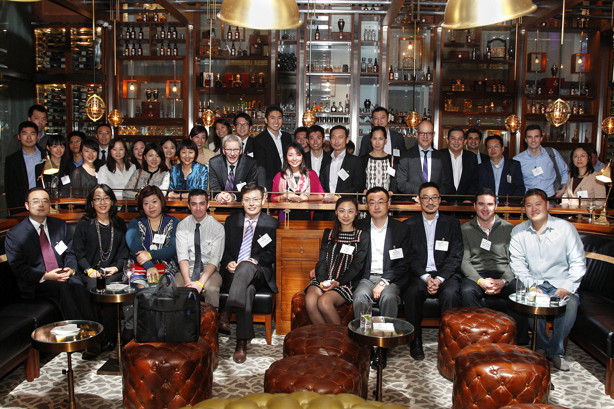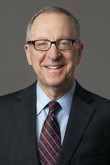END NOTE
Growing an international Cornell

Fredrik Logevall, vice provost for international affairs, and School of Hotel Administration Dean Michael Johnson joined members of the Cornell clubs of Shanghai, Hong Kong and the Philippines at an Oct. 30 reception in Shanghai. Photo: Jason Lee/Mubla Studio.
Cornell, long one of the most international and internationally active universities, is on the cusp of a new era of internationalization that will profoundly influence our teaching, research and the way in which we engage the world. Following from a white paper on internationalization that I put forward in 2012, a 10-member faculty task force, including representatives from the Ithaca campus and Weill Cornell Medical College, developed recommendations to enhance Cornell's excellence in international studies and international engagement.

Cornell President David J. Skorton. See larger image
Professor Fred Logevall, Pulitzer Prize-winning historian and director of our Mario Einaudi Center for International Studies, was a member of the internationalization task force, and I am delighted that he has stepped up to lead our internationalization efforts as vice provost for international affairs.
I have long been concerned that, despite the large number of international students on Cornell's campuses and the global nature of so much of our research, scholarship and creative work, the university has been slipping relative to some of our peers in terms of internationalization and that our students are graduating less prepared than they might be for life in an increasingly interconnected world.
In the white paper I challenged us to regain our global edge, internationalize the curriculum and increase to 50 percent the number of students having "significant" international experiences. We have committed $3 million a year for five years, primarily from philanthropy, to support Cornell's internationalization efforts with the expectation that we will generate additional resources sufficient to sustain Cornell's internationalization activities.
New Cornell undergraduate students overwhelmingly believe that it is "very important" or "essential" that they gain an "understanding of other countries and cultures." Yet a survey of all undergraduates conducted in April 2013 found that only 12 percent of respondents had studied abroad and another 23 percent planned to do so. Clearly the time is right to enhance the number and quality of international opportunities available to students and also to strengthen the international components of the curriculum to better serve students whether or not they elect to spend time abroad.
Internally, we've established an Internationalization Council, with each college on the Ithaca campus as well as Weill Cornell Medical College represented. The council will develop a contemporary vision to advance the university's international dimension and establish pathways, with goals and objectives, to move us toward that vision. Council members, along with Fred Logevall and Senior Vice Provost for Undergraduate Education Laura Brown, will play leadership roles within their colleges – for example by formulating college-specific ways to internationalize the curriculum and by incorporating internationalization in college strategic plans.
One of our greatest resources is the large body of Cornell alumni who live and work around the world. I am delighted that Martin Tang '70, Cornell trustee emeritus and presidential councillor who lives in Hong Kong, has agreed to chair an external advisory council on internationalization. Among the many ways he has already served Cornell, Martin Tang has inspired endowment gifts through the Martin Y. Tang International Scholarship Challenge to support undergraduate and graduate students. We are in the process of recruiting additional members to serve on this new council.
Our aim, as Fred Logevall has noted, is to be "a truly international university that educates globally competent and culturally sensitive students for leadership in an increasingly international environment; fosters cutting-edge research within and across national boundaries to contribute to the expansion of the knowledge essential for understanding this environment; and engages in development activities and public services to enhance the lives and livelihoods of our students and others around the world." By involving every college and school, broadening the role of the Einaudi Center, internationalizing the student experience, and tapping the expertise of internal and external advisory councils, we are creating a foundation for success.
David J. Skorton is president of Cornell University.